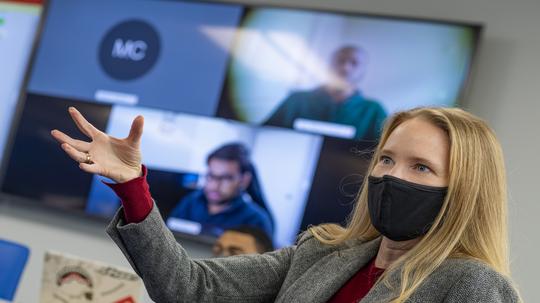
Experts agree on two things these days: The Covid-19 pandemic will eventually come to an end, and life as we know it will never be the same. The way we work will be drastically different, and the skills workers need to thrive are already changing.
The next normal
The pandemic accelerated a digital revolution that was already underway — from remote working and online shopping to automation and artificial intelligence. We have seen a massive explosion in technology of various types over the last year, primarily due to necessity, and companies both big and small are figuring out how to do things in new ways. Expectations have changed, too. Companies are adapting and using new business models, and workers are learning to manage remote relationships with clients, customers and teams.
Employees are becoming more entrepreneurial. They are picking up technical skills and increasing their reach and value within their organizations. Careers will be less likely to follow a typical ladder, with employees working different kinds of jobs throughout their journey.
Take Kennedy Crandell. A few years into her career as a social worker, she decided to make a dramatic career shift into data science. Since enrolling in the Graduate Certificate Program in Artificial Intelligence Business Innovation at Georgia State University's Robinson College of Business, she has acquired many technical skills despite no previous programming experience. Thanks to her Introduction to Programming and Predictive Analytics for Business class, she now counts Python, predictive models, linear regression and the k-nearest neighbors algorithm among her skillset. Her class projects including helping Airbnb hosts optimize listing prices and creating an app to connect artists and entertainers with employment opportunities.
Like Crandell, a more highly skilled workforce may find itself multitasking in new ways, assigned to jobs they excel at and are interested in, but with the added ability to move around in more of a consulting role. They may find themselves doing projects for multiple people and parties, all while building their capabilities. They may even be interning or working part-time while pursuing a niche passion project or creative pursuit on the side. One thing is clear: there is a need for professionals to continue to learn throughout their careers, and that need is only accelerating.
In-demand skills
It is not just technical skills that are important. According to the World Economic Forum’s Future of Jobs Survey 2020, some of the top skills employers are looking for in the coming years are:
- Analytical thinking and innovation.
- Complex problem-solving and reasoning.
- Critical thinking and analysis.
- Creativity, originality and initiative.
- Resilience, stress tolerance and flexibility.
To thrive in the next normal, leaders must be comfortable with ambiguity, experimentation and failure. Leaders need soft skills like communication, dealing with uncertainty and creativity. And it’s important to be able to solve problems and bring new ideas to market. It is not enough to know about digital trends or have the latest tools and technologies at your disposal; you must be able to do something with that information to add value.
Business schools are ensuring that graduates are equipped with these skills and better prepared to thrive in what is being called the fourth industrial revolution. Learners themselves demand more flexible, affordable programs that they can pursue alongside their work. The solution? Micro-credentials that help facilitate lifelong learning.
At Robinson, for example, you can enroll in four-course, two-semester certificates in Artificial Intelligence and Business Innovation, Disruptive Innovation and Entrepreneurship and Fintech Innovation. Better yet, flexible graduate certificate programs like these require less time and money than a full-blown degree — and, should you decide to take your certificate even further, the credits can be applied upon admission toward Robinson’s Flexible MBA program as well as select master’s degrees like the M.S. in Data Science & Analytics or the M.S. in Finance. Students who go this route are already 40% of the way toward the required credit hours for their M.S. degree.
Robinson has also developed its Innovation Studio as a flagship component of its graduate certificates. The required class, offered in the first semester, brings learners together in an unstructured format to develop a business concept or startup idea to build throughout the certificate program. The studio is designed to push you to think about innovation, creativity, and problem-solving in new ways. It is a different way of learning, designed to get you outside your comfort zone, and offer exposure to varying points of view.
Our graduate certificate program is designed to make you comfortable with being uncomfortable, and in that way, it is a confidence builder. The program creates the kinds of unique experiences that you cannot get anywhere else, leading to the type of skills that graduates can use to stand out in the next normal.
To learn more about Robinson’s graduate certificates and how to build new skills for the next normal, please visit the website.
Georgia State University's J. Mack Robinson College of Business is among the top 10 largest accredited business colleges by graduate enrollment, according to the Association to Advance Collegiate Schools of Business (AACSB).



